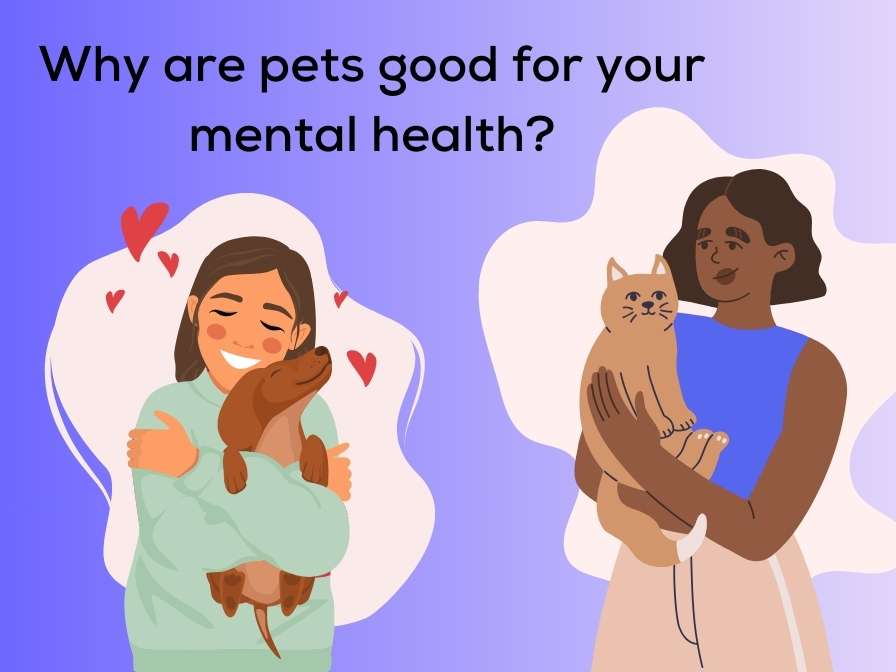Why are pets good for your mental health?

In an increasingly fast-paced and stress-laden world, the need for good and doable methods of managing mental health is more critical than ever before. While therapy, meditation, and lifestyle changes are commonly recommended, there's one therapy that comes with wagging tail and constant comfort: pets. The benefits of having a furry, feathered, or scaly friend go beyond companionship and have been shown to boost the mental health of their owners. Here are some reasons why having a pet positively impacts your mental health.
Love and Companionship
One of the most significant ways pets contribute to our mental well-being is through the unconditional love, companionship and loyalty they offer. Whether you have a loyal dog, a chatty parrot, or a cuddly cat, these creatures don't judge, criticize, or hold grudges. They provide unwavering support and comfort during difficult times, reducing feelings of loneliness and isolation. They will stand by you and will come to you for comfort as a person they completely trust in. This can boost confidence and reduce negative feelings.
Stress Reduction
Interacting with pets has been demonstrated to reduce stress levels. Petting a cat or dog, for instance, can stimulate the release of oxytocin, a hormone connected to bonding and stress reduction. The soothing, rhythmic act of petting a pet is an effective method for alleviating stress, which in turn can lead to decreased blood pressure and anxiety levels.
Social Interaction
Pet ownership often leads to increased social interaction. Taking your dog for a walk or visiting the dog park can open doors to meet and connect with fellow pet owners. These social interactions help combat feelings of loneliness and build a support system.
Increased Physical Activity
Pet ownership, especially having a dog, promotes physical activity. Engaging in regular exercise, such as taking a brief daily walk, offers many mental health advantages. It stimulates the release of endorphins, aids in weight control, and fosters a sense of achievement, all of which can be effective in alleviating symptoms of depression and anxiety.
Routine and Structure
Pets require routine care and attention, such as feeding, grooming, and exercise. This routine can provide structure to a person's day, especially for those struggling with conditions like depression. Establishing a daily schedule can improve time management and give a sense of purpose, contributing to better mental health.
Mindfulness and Presence
Pets exist in the present moment, and their mere presence inspires us to be more mindful. This heightened awareness can serve as a valuable technique for coping with conditions such as anxiety and depression. Concentrating on the pure delight of interacting with your pet or observing their playful behavior can serve as a means to divert attention away from negative thought patterns.
Reduced Anxiety
For those dealing with chronic anxiety, pets can be a calming presence. Therapy animals help with anxiety by offering emotional comfort, reducing stress through physical interaction, and providing distraction from anxious thoughts. They also introduce routine, encourage social interaction, and reduce isolation, all of which can be especially beneficial for individuals dealing with anxiety.
However, it's crucial to remember that therapy animals are a complement to, not a substitute for, professional mental health treatment. It's important to note that therapy animals are not a substitute for professional mental health treatment. While they can be highly beneficial, individuals with anxiety should also seek guidance from mental health professionals who can provide appropriate therapies and interventions.
Emotional Support
Pets have a remarkable ability to perceive our emotions and provide solace when we're in low spirits. They create a non-judgmental environment where we can freely express our feelings, and their mere presence can be profoundly reassuring.
The evidence is clear: pets are good for mental health. Their presence and companionship provide comfort, reduce stress, and promote physical activity. The emotional bond we share with our pets can have a profound therapeutic effect.
However, it's essential to remember that pet ownership is a significant responsibility and shouldn't be taken lightly. If you're considering bringing a pet into your life, make sure you have the time, resources, and commitment required to provide them with the care and love they deserve. In a world filled with complexities and challenges, the simplicity of a pet's love can be a powerful tool for our mental well-being. So, whether you have a wagging tail, a playful meow, or a feathered friend, embrace the healing paws in your life and cherish the positive impact they have on your mental health.